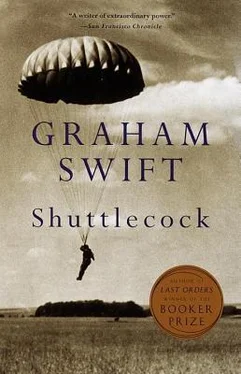Quite often I play chess with Des, on a fold-up wooden table on the terrace. Whatever has happened to Des’s mind, it is perfectly adept at chess, for he usually beats me. We sit on opposite sides of the table and Dad sits, looking blankly on, between us, as if we have given him the duty of umpire, and now and then we say, keeping up a pretence, ‘Dad’ (for Des uses that word too as if to show he and I have the same interests at heart) ‘where shall I move? Which is the best move? The rook or the bishop?’ And we imagine that when a move is successful it is Dad’s advice that has brought it about. Sometimes I get so absorbed with the game — not just as a means of whiling away the visiting hours but with the game itself and being there on the terrace — that the official time for visitors to leave comes before I am aware of it, and Des has to preserve the position of the pieces for another day. When I show a reluctance to stop, and even to leave at all, Des, and Simpson too, occasionally wink at me, as much as to say, ‘We understand.’
When I play chess with Des I think: a sane man, a man labelled insane cheerfully engrossed in the same activity when there should exist between us an uncrossable boundary line. Sanity? Insanity? Terrible problems? No, their problems are over. And when Des starts to ramble (for occasionally he starts to ramble, like a true hospital inmate), when he starts to speak of that other man, the master of the merchant vessel Eucalyptus , I think, no, it is not madness which is locked up and concealed like a crime, but something concealed behind madness. It was Des himself who, one day when Dad had been not long in his ward, came up to me and said, tapping his nose, ‘You know the meaning of “Eucalyptus”? — “Well-hidden”.’
But all these observations and reflections (you are wrong if you think I am normally a thoughtful man — it is just something brought on by this urge to write things down) I do not make at all about Dad. I only make them about the hospital at large, as if about some abstract proposition. With Dad, despite the regularity of my visits and the continual silence in which we sit, there seems no time for thought or detachment. It is true, with every visit the more likely it becomes that nothing will change, that that silence will be never-ending. And yet each time I cannot help feeling, this time he will speak, and each time is special and urgent. Very often, when I come home afterwards, rather than that strange, lingering calm of the hospital, it is tension I feel; I tremble as if I have been involved in some immense struggle. For perhaps that is what they are, my meetings with Dad. His silence against my wish to hear him speak. We face each other like antagonists across a table (a different sort of chess, this), and one of us must crack first.
Do you recognize me? Answer me.
Is he doing it all to punish me?
I don’t believe it can go on for ever. I don’t believe they will send Dad on to ‘Fuchsia’ and then to ‘Gladiolus’. If he endured the Château Martine (you were tortured, weren’t you Dad? but you came through it) surely he will not yield to this. But only today I thought: perhaps it is by the self-same method he held out then as now: by keeping silent. And who can say that that is not the reason for Dad’s present plight. Maybe what happened long ago at the Château Martine was so terrible as to have delayed effect thirty years later; and maybe while he sits on the wooden bench or on the wicker chair, amidst these innocent, therapeutic surroundings, he is really reliving endlessly — is it possible? — the torture of another time and place.
Sunday. The cedar tree. It was on my lips today to say, ‘You knew X, didn’t you? Who was he?’ What stops me? Is it the fear of seeing Dad’s face suddenly split with real pain? The fear of not being able to bear that?
The fountain was playing on the ornamental pond. We walked back to where the others sat like infinitely sagacious spectators on the terrace. All I said was: ‘I shan’t be here on Wednesday, Dad. I am going to see Mr Quinn.’ (Now I know why I fixed on Wednesday. So Marian won’t know. She’ll believe I’ve gone to see Dad as usual. I’m not going to tell Marian I’m going to Quinn’s.) ‘He’s invited me to his home.’ As if Dad should answer, ‘Ah yes, Mr Quinn, how kind of him.’ ‘He’s going to tell me everything.’ (Or rather, I didn’t say that — only in my head. And nor did I say: ‘Unless you tell me first.’)
‘So till next Sunday then.’
The bell was going for visitors to leave.
‘Don’t expect me on Wednesday.’
I left Dad on the terrace, with Des, Simpson and the others, and as I looked back, his still figure — that strong, intrepid, noble figure — seemed suddenly quite forlorn, as if I were leaving him for good.
And when I got home I took out Dad’s book and dipped straight into it (those final chapters), with scarcely a word, not even an ill-tempered one, to Marian and the kids.…
Marian is sulky and smouldering with silent resentment. Another Sunday has passed by — another beautiful sunny Sunday — and once again we haven’t gone out, because I have taken the car and spent the afternoon with Dad. Yes, I know what she would say, if she had half the chance, about our ‘wasted’ Sundays. That I am the one who has this thing — or used to have — about going out into the open, about the countryside. I am the one who wants fresh air and hates skulking indoors. Yes, yes. As I turn the pages of Dad’s book I have to brush aside a momentary vision of the weekends we used to have. Marian and I stripping hurriedly in the ferns. Wasps in the picnic basket.
Tonight we are unusually quiet and by ourselves. The kids are having a special treat tomorrow: they are going on a school outing to Chessington Zoo. They have to be away sharply, and this has given us the excuse for sending them early to bed. It’s nearly ten now, and we ourselves could have an early night. But you know those Sunday evenings, when the weekend has been a failure and you’re conscious that tomorrow is Monday, and you just try to mark time. The evenings are long and light; and there’s just a hint of something magic in the sky which only now, when it’s too late, do you notice, and which says: Fools! What do you want to go to sleep for, only to wake up for work? Marian has been pottering in the garden, and now she’s going round with her plastic watering-can, watering her house-plants. I can hear her muttering to the peperomias and the sweetheart vine: ‘Here you are then — I expect you’re thirsty. There, that’s better. We want to make you grow up big and strong, don’t we?’ I think she kisses them goodnight. It makes me jealous. I watch her through the open door of the living-room, bending over the rack of plants in the hall. She wears a pair of faded jeans and a thin, short-sleeved top that stops inches from her waist. I think: if she put down the watering-can and I put down my book we could lock up the house and go to bed and make love, hotly and deliberately, and lie awake for a while afterwards. Then everything would be clear and resolved between us. But we haven’t made love of any sort for weeks. Instead, Marian makes love to the house-plants. ‘… we want to keep those nice green glossy leaves.…’ I watch her through the doorway. There is something less provocative than disturbing about that chink of bare flesh above her jeans.
… The Gestapo officers, despite their air of icy efficiency, were all nervous. They knew they were conducting operations which at any moment might be cut short by the arrival of the Americans or by the command to withdraw. Every so often in these last few days, when the wind was right, we had heard the distant sound of shell-fire. This was a factor in my favour. But it worked both ways. The nervousness of the Germans might make them act with ruthless haste.
Читать дальше












